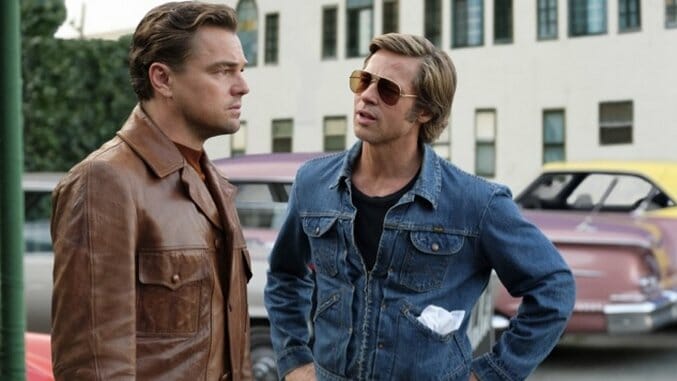Once Upon a Time in Hollywood

1. For all the criticism that Wes Anderson is a dollhouse filmmaker—an artist who creates special, delicate little worlds that exist solely for themselves to roam in—Quentin Tarantino has always struck me as the most self-contained American director. His movies are uniquely his in a way that sometimes does them a disservice. His indulgence, and our encouragement of that indulgence, can occasionally feel like we have given a child so many toys that he can not play with anyone but himself. The Tarantino of Jackie Brown, the one who could warmly merge someone else’s sensibility with his own, has been gone for more than a decade now; this playground is his and his only. This isn’t always a bad thing: Inglourious Basterds might be his masterpiece because Tarantino is allowed to be so gloriously unrestrained. But since that film, and since the tragic death of his editor Sally Menke, he has been spinning in circles, making movies to scratch only his own itches. We’ve been watching him making movies more than we’ve been, you know, watching movies.
2. Once Upon a Time in Hollywood is as much a run through Tarantino’s obsessions as any of his other movies—Spaghetti Westerns, bad ’60s television, Los Angeles subculture, so, so many women’s feet—but there is an odd, almost casual generosity that I’d argue is entirely new to him. Is it possible Tarantino, at 56, has finally decided to share? This is a film that luxuriates in its indulgence, but it opens the door for us, at last lets us in. It’s an elegy for a long-dead Los Angeles that Tarantino both wants to sell us on and vigorously stir back to life, an era that, because it ended in violence, can only be resuscitated through that same violence. But more than anything, this is the most Hang Out Film of any of Tarantino’s films, a world that he wants to live in and roll around in and maybe just spend forever in. The difference is that this time he wants you to live there with him.
3. We follow three characters with three stories, though it takes a while for two of the stories to separate and they all end up in the same place. There’s Rick Dalton (Leonardo DiCaprio), an old-time television star with talent but an alcohol problem whose time seems to be passing him by, symbolized by a series of villainous guest spots on TV shows with diminishing returns. There’s Cliff Booth (Brad Pitt), Dalton’s old stunt man and full-time assistant/gofer, a man with a dark past but the sunny, sun-splashed disposition of a guy who’s always going to get away with it. And then there’s Sharon Tate (Margot Robbie), the Sharon Tate, an up-and-coming movie star who lives just down the road from Dalton with her husband Roman Polanski, with the whole world ahead of her but with … occasional strange characters showing up outside her house. The movie leisurely weaves in their stories, sometimes down narrative cul-de-sacs, sometimes their goings-on simply an excuse to dance through Tarantino’s meticulous, almost sensuous recreation of 1969 Hollywood. But it’s all leading up to the moment when they all cross paths, and history both gets in the way and is shoved aside.
-

-

-

-

- Curated Home Page Articles By Test Admin October 21, 2025 | 3:10pm
-

- Curated Home Page Articles By Test Admin October 21, 2025 | 2:57pm
- Urls By Test Admin October 21, 2025 | 2:57pm
- Curated Home Page Articles By Test Admin October 21, 2025 | 2:55pm
-

-

-

-

-

-

-

-

-

-

-

-

-

-

-

-

-

-

-

-

-

-

-

-

-

-

-

-

-

-

-




































